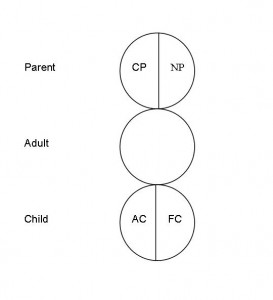
I want one and I want one NOW!
The Apple iPhone 4 will be available to buy from the 24th June and I am very excited! I want to run to the nearest Apple store and get in the Queue already. I want to hand over my £200 and sign up for that 2 year contract despite the fact that when I look at it, when I really think about it, the iPhone 4 isn’t really much different from the iPhone I own now. For me it’s the same with the Apple iPad. I have been down to the store and held one in my hands. I have caressed its smooth, glassy body. I have imagined myself sat on my sofa, surfing the web like I’ve never surfed before! I realise I am what’s referred to distastefully on the internet forums as “An Apple Fan boy”. There is definitely something about their products that increases my desire to splurge large amounts of my hard earned cash. What’s going on?
I want to address this question over a series of blog posts. The subject is too big for one blog post and as I write it, it even seems to have grown too big for two! So I will split it into three posts that will link together.
Part 1 – urges and ego states
Part 2 – How we can use what we know about ego states to calm our urges
Part 3 – Urge surfing, the ACT approach to urges.
Part 1 – Urges and Ego States
It doesn’t really matter here whether we are talking about an iPhone, iPad, a new car, a new hand bag, clothes or even tasty chocolate biscuits. There is something in our human make up that allows us to become fixated, all be it temporarily. Most of the time for most people it’s not a problem provided we stay within the limits of what we can afford, but what can we do to quell these urges when they threaten or physical, emotional or financial health?
What can we do to quell these urges when they threaten or physical, emotional or financial health?
In Transactional Analysis we often look at human personality from the perspective of ego states. The ego state model is useful because is gives us something to hang our ideas onto. It’s a model of personality. At the risk of upsetting many TA therapists, I am going to boil the ego state model down to the simplest level possible (TA aficionados are welcome to post comments, please keep the swearing to a minimum!).
Our thinking, feelings and behaviour can be divided into several parts. These are known as Parent, Adult and Child ego states. The normal convention is to capitalise when discussing ego states and use lower case when referring to real parents, adults and childs (I know, it’s not a real word but I kinda like it!). The ego state model I am writing about is referred to as the functional model – how we use the ego states to relate to others and ourselves.
 Our Parent ego state pretty much repeats what we heard from our childhood caretakers. It is full of information from them about how to view see the world and how to react to it. This information can be Nurturing (NP) or Controlling (CP). There are positive and negative aspects of Controlling and Nurturing Parent. It’s good to have a Controlling Parent to tell you to stop and check before crossing a road but not so good to hear that Controlling Parent in your head all the time telling you that you are doing things wrong. The Nurturing Parent that allows overindulgence in chocolate (or IPads) can be doing you a disservice, but the Nurturing Parent that tells you or someone else who has been working hard to take a break can be very useful.
Our Parent ego state pretty much repeats what we heard from our childhood caretakers. It is full of information from them about how to view see the world and how to react to it. This information can be Nurturing (NP) or Controlling (CP). There are positive and negative aspects of Controlling and Nurturing Parent. It’s good to have a Controlling Parent to tell you to stop and check before crossing a road but not so good to hear that Controlling Parent in your head all the time telling you that you are doing things wrong. The Nurturing Parent that allows overindulgence in chocolate (or IPads) can be doing you a disservice, but the Nurturing Parent that tells you or someone else who has been working hard to take a break can be very useful.
Our Adult ego state is able to take in the here and now reality of the situation. It processes information and regulates most of the things we do. When we follow instructions or drive a car, our Adult ego state is happily and fruitfully engaged.
Our Child ego state can be compliant and well mannered or rebellious and badly behaved. In TA terms both of these would be classed as “Adapted Child” (AC) as in both situations we are adapting to the environment around us, either positively or negatively. The other way the Child ego state functions in is called “Free Child”(FC). The Free Child likes to run barefoot on a sun drenched beach, play and laugh with those nearby, cry when sad, shout when angry. The free Child is not restricted by what others think.
There are entire books written about ego states, various models and theories about how they work or even if they exist at all so if it is a subject you are interested in I would recommend more research. TA today by Stuart and Joines would be a good place to start.
In my next article I am going to explain what may be going on in my ego states when I think of that Apple iPad. Please comment at the bottom of this article and press all of the other pretty buttons to send it to other social media sites!
 When the tough times hit do you find yourself having the same familiar response? Do you find yourself in the same situations and feeling the same negative feelings? In transactional analysis language, we call these old familiar feelings racket feelings. We can collect up these feelings and cash them in later for a prize. This is called “stamp collecting” in Transactional Analysis after the old loyalty scheme system of being given trading stamps when making a purchase at a shop (think Tesco club card in the 70’s!)
When the tough times hit do you find yourself having the same familiar response? Do you find yourself in the same situations and feeling the same negative feelings? In transactional analysis language, we call these old familiar feelings racket feelings. We can collect up these feelings and cash them in later for a prize. This is called “stamp collecting” in Transactional Analysis after the old loyalty scheme system of being given trading stamps when making a purchase at a shop (think Tesco club card in the 70’s!) I am a lucky man because I work in two areas that I enjoy and find fascinating. These are the vocations of teaching and psychotherapy and I love it when they come together. This is lucky because they come together frequently. In fact they’re rarely apart. Teaching is about relationships. Psychotherapy is about relationships. They are made for each other.
I am a lucky man because I work in two areas that I enjoy and find fascinating. These are the vocations of teaching and psychotherapy and I love it when they come together. This is lucky because they come together frequently. In fact they’re rarely apart. Teaching is about relationships. Psychotherapy is about relationships. They are made for each other.